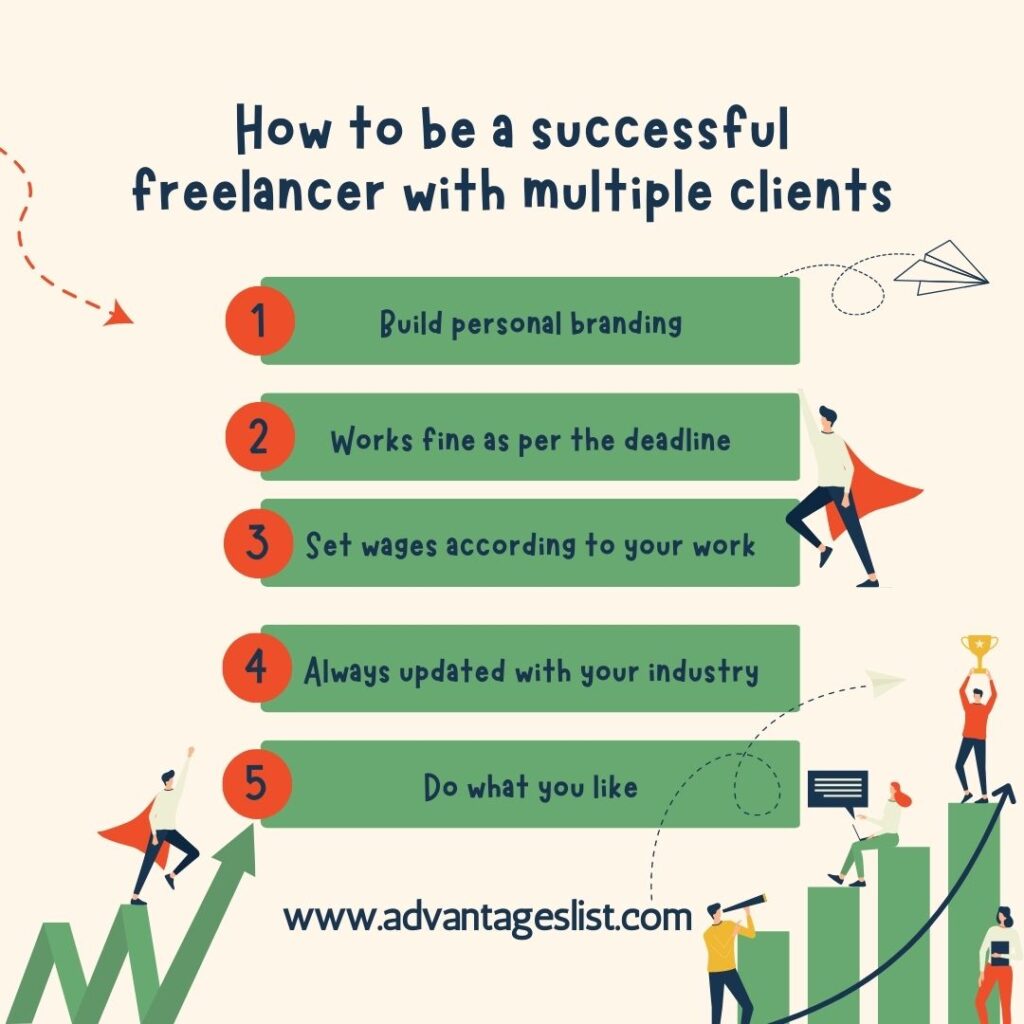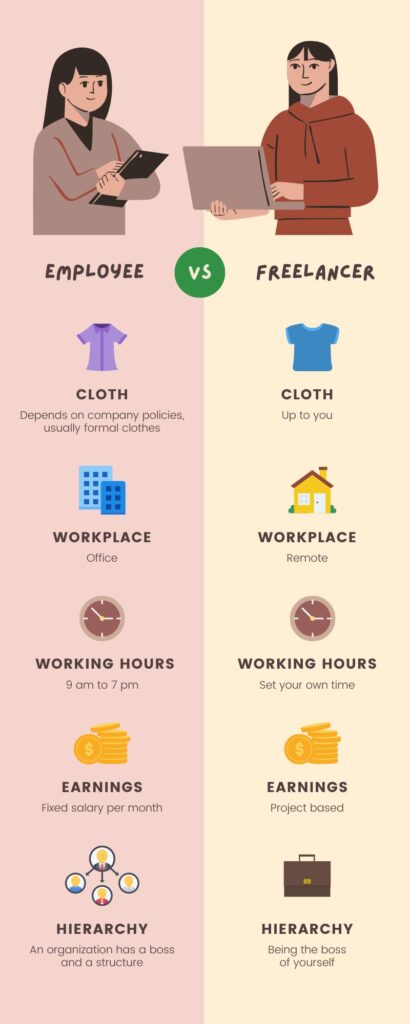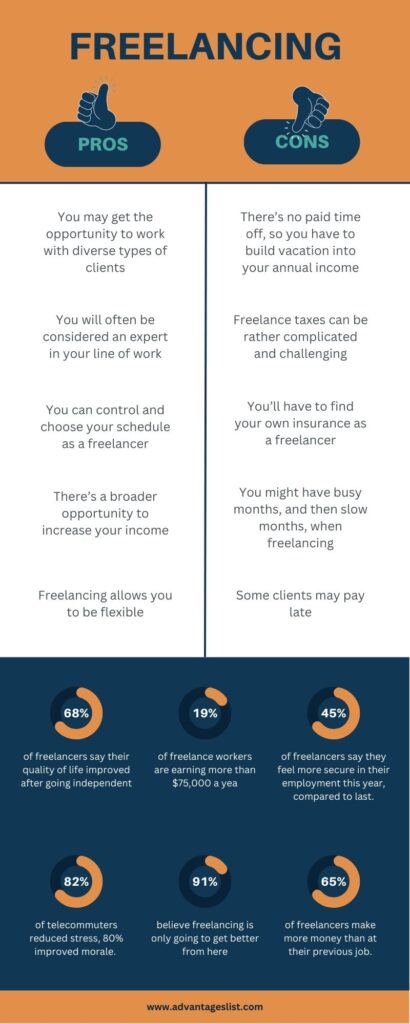Many people dream of the financial freedom that can come from turning their passion into a career. But breaking into the freelance world is not easy. This blog post will discuss how to start a freelancing and offer tips for getting started.
What Is Freelancing?
Freelancing is the act of working for yourself. Rather than having a single employer, you can work for as many clients as you want.
Ideally, freelancing allows you greater flexibility in your work schedule and lets you choose what projects to spend your time on. Freelancing can be a full-time career or a side job to bring in some extra cash.
Who is the Freelancer?
Freelancing can be a business for someone who continues working in the field they were already in and wishes to expand their knowledge. It can also be a job to make extra money or supplement income.
Freelancers are found anywhere, from top-level management to the most obscure specialties. Freelancing can be a great way to make money on the side while maintaining an existing career.
Why freelancing is important?
Freelancing allows you to control your own time. By avoiding face-to-face meetings with clients, you can work on projects that interest you.
It also makes you more attractive to clients and others in the industry. The benefits of freelancing are wide-ranging, whether you enjoy flexibility or see it as a way to earn money.
13 Tips on How to Start Freelancing for beginners?
Freelancing is a great way to make money on the side. Many people are turning to freelance as a way to earn extra cash, or even as a full-time job.
But freelancing takes time to learn and it can be difficult for beginners to turn their passions into money-making careers. For first-timers, we have some tips on how to get started. Let’s explore how to start freelancing.
1. Set your expectations
Freelancing can be a great side job, but it doesn’t mean that you can just start doing any project. Instead, think about the type of projects you would enjoy. Focus on your talents and try to find ways to turn them into a business.
For example, if you enjoy photography, you could offer your services as a wedding photographer or freelance for local businesses.
2. Understand your niche
Niche means a group of clients who are similar in terms of experience, expertise, and interest. This means that you will be spending anywhere from 20 minutes to a few hours on each project.
Understanding this is key to getting ahead as a freelancer. As a Freelancer, you must need to cater to clients who are similar to you and understand your niche market.
3. Establish credibility
Once you’ve decided on a niche, it’s time to start pitching your services. This part can be tricky for beginners because you will be meeting face-to-face with clients.
There is no need to feel nervous or awkward, just present yourself as you are and try to find a common ground. Ask questions, but don’t be too pushy. Most people will appreciate your honesty.
4. Become a generalist or a specialist
Choose whether you want to become a generalist or a specialist. If you are looking to make money from freelance writing, then you should build up your portfolio and focus on becoming an expert in one specific area.
Generalists and specialists differ from each other. A generalist, who can do more than one type of project, is more appealing to an employer. A specialist, who can only work on one type of project, is more suitable for unaffiliated.

5. Be willing to learn
Freelancing offers you the opportunity to work on new projects in a variety of industries, but you don’t have to start out as an expert.
You can get started by offering to work for free. You can also offer to do work for free in exchange for experience. In either case, working for free will help you get a feel for the industry and learn about potential clients.
6. Build a website
Having a website is a great way to show clients your work. But more importantly, it helps you keep track of your own portfolio.
Make sure to include a brief description of what you can offer, examples of your past work, and contact information so clients can get in touch with you easily. Most freelancer fails because of a lack of knowledge in the freelancing field.
Knowledge is power, and even a slight edge can mean the difference between success and failure. So, build your portfolio, add relevant information and links, create a website, and make sure you follow all the rules of every WordPress plugin.
7. Leverage the power of social media
Use social media as a means of networking and gaining industry contacts. One great option is to use a site like LinkedIn.com to connect with professionals in your industry as well as potential clients.
8. Pick tools within your budget
Freelancing requires you to invest in both physical and software items, as well as advertising if you want to get clients.
Use your budget as your guide for what tools and services you can afford. For example, if you are looking to create a website, look for tools that help you build your portfolio and make it easier to show clients what you offer.
9. Create a portfolio of samples
It’s important to have samples of your work on hand, so you can show potential clients what you can do. Even if you are working on a few different projects, it’s a good idea to have one or two that are focused and standards-compliant.

10. Set your rate & Find the right job boards
If you have several years’ worth of experience under your belt, you may be able to charge a higher rate. If you are just getting started, make sure to set your rate slightly lower and be willing to negotiate. Consider doing a few free projects in order to build your portfolio and experience.
11. Try Freelancing Part-Time
Freelancing part-time is a great way to get your feet wet and make some extra money on the side. You can also try freelancing in your free time and building up your portfolio before you commit to going full-time. You’ll amaze that I started my first job as a freelancer that’s the power of skill.
12. Find The Right Freelance Platform
For self-employed, you need a freelance platform that offers you a variety of services. For example, if you are looking to build a website, there are platforms that offer website designing services as well as hosting.
Another great option is to offer voice-over services. Fiverr, Upwork, PeoplePerHour, Freelancer are some of the most popular freelancing platforms.
13. Learn from your mistakes
Last but not least, learn from your mistakes. We all make mistakes, and sometimes they are big ones. Don’t be afraid if things don’t just work out the way you planned. Try to see what went wrong and think about how to avoid a similar situation in the future.
Pros and Cons of Freelancing
There are plenty of pros and cons of freelancing. The main pros include the ability to be your own boss and setting your own hours, as well as being able to choose what projects you want to work on.
The cons are that most freelancers have to manage their own time and schedule. Also, you have to be willing to do a lot of networking and there is a lot of competition in the freelance marketplace.

FAQs
Most people start by finding a niche, building a portfolio, and making sure to work on the projects they are interested in and enjoy doing.
Where can I start freelancing?
Freelancing is something you should do as a hobby or side business. I have taken some flak from my friends in certain instances, but I have also received many compliments for my work.
List of freelancing platforms?
Freelancing platforms include Fiverr, PeoplePerHour, Upwork, and Freelancer.
My Thoughts
Freelancing is a great way to get paid for the work you do and can be a good way for people to earn extra income. It also acts as a good way to develop your skills, get some experience and establish your own business.
Most of freelancers are not satisfied by the income they get from freelancing. Don’t have high expectations in the first few months of freelance work. You need to focus in the given field, learn every concept and connect with the right clients.
If you are not able to do this then it means you don’t want to work as a freelancer. We hope we give you some tips and tricks to get started as a Freelance designer.
The most important thing in “how to start a freelancing” is to make it work for your lifestyle, see if you can work freelance from home based jobs or from the office. If you have a fixed office set up, then you can take advantage from that.
If you don’t have any office and can work from home, then that is a good option too. What ever you decide to do in your life you should make it work for your lifestyle and comfort zone.
Read More: 10 Special Advantages Of Freelancing 13 Disadvantages Of Being A Freelancer

